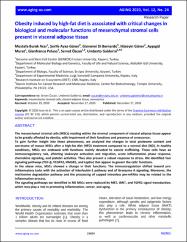| dc.contributor.author | Acar M.B. | |
| dc.contributor.author | Ayaz-Guner S. | |
| dc.contributor.author | Bernardo G.D. | |
| dc.contributor.author | Guner H. | |
| dc.contributor.author | Murat A. | |
| dc.contributor.author | Peluso G. | |
| dc.contributor.author | Ozcan S. | |
| dc.contributor.author | Galderisi U. | |
| dc.date.accessioned | 2021-06-17T08:02:19Z | |
| dc.date.available | 2021-06-17T08:02:19Z | |
| dc.date.issued | 2020 | en_US |
| dc.identifier.issn | 19454589 | |
| dc.identifier.uri | https://doi.org/10.18632/aging.202423 | |
| dc.identifier.uri | https://hdl.handle.net/20.500.12573/772 | |
| dc.description | The mesenchymal stromal cells (MSCs) residing within the stromal component of visceral adipose tissue appear to be greatly affected by obesity, with impairment of their functions and presence of senescence. To gain further insight into these phenomena, we analyzed the changes in total proteome content and secretome of mouse MSCs after a high-fat diet (HFD) treatment compared to a normal diet (ND). In healthy conditions, MSCs are endowed with functions mainly devoted to vesicle trafficking. These cells have an immunoregulatory role, affecting leukocyte activation and migration, acute inflammation phase response, chemokine signaling, and platelet activities. They also present a robust response to stress. We identified four signaling pathways (TGF-β, VEGFR2, HMGB1, and Leptin) that appear to govern the cells’ functions. In the obese mice, MSCs showed a change in their functions. The immunoregulation shifted toward pro-inflammatory tasks with the activation of interleukin-1 pathway and of Granzyme A signaling. Moreover, the methionine degradation pathway and the processing of capped intronless pre-mRNAs may be related to the inflammation process. The signaling pathways we identified in ND MSCs were replaced by MET, WNT, and FGFR2 signal transduction, which may play a role in promoting inflammation, cancer, and aging © 2020. Acar et al. This is an open access article distributed under the terms of the Creative Commons Attribution License (CC BY 3.0), which permits unrestricted use, distribution, and reproduction in any medium, provided the original author and source are credited. All Rights Reserved. | en_US |
| dc.description.abstract | The mesenchymal stromal cells (MSCs) residing within the stromal component of visceral adipose tissue appear to be greatly affected by obesity, with impairment of their functions and presence of senescence. To gain further insight into these phenomena, we analyzed the changes in total proteome content and secretome of mouse MSCs after a high-fat diet (HFD) treatment compared to a normal diet (ND). In healthy conditions, MSCs are endowed with functions mainly devoted to vesicle trafficking. These cells have an immunoregulatory role, affecting leukocyte activation and migration, acute inflammation phase response, chemokine signaling, and platelet activities. They also present a robust response to stress. We identified four signaling pathways (TGF-β, VEGFR2, HMGB1, and Leptin) that appear to govern the cells’ functions. In the obese mice, MSCs showed a change in their functions. The immunoregulation shifted toward pro-inflammatory tasks with the activation of interleukin-1 pathway and of Granzyme A signaling. Moreover, the methionine degradation pathway and the processing of capped intronless pre-mRNAs may be related to the inflammation process. The signaling pathways we identified in ND MSCs were replaced by MET, WNT, and FGFR2 signal transduction, which may play a role in promoting inflammation, cancer, and aging © 2020. Acar et al. This is an open access article distributed under the terms of the Creative Commons Attribution License (CC BY 3.0), which permits unrestricted use, distribution, and reproduction in any medium, provided the original author and source are credited. All Rights Reserved. | en_US |
| dc.description.sponsorship | Erciyes University Research Project Fund
BAP-FYL-2017-7399
Università degli Studi della Campania Luigi Vanvitelli
CUP B23D18000250007 | en_US |
| dc.language.iso | eng | en_US |
| dc.publisher | Impact Journals LLC | en_US |
| dc.relation.isversionof | 10.18632/aging.202423 | en_US |
| dc.rights | info:eu-repo/semantics/openAccess | en_US |
| dc.subject | visceral adipose tissue | en_US |
| dc.subject | senescence | en_US |
| dc.subject | mesenchymal stromal cells | en_US |
| dc.title | Obesity induced by high-fat diet is associated with critical changes in biological and molecular functions of mesenchymal stromal cells present in visceral adipose tissue | en_US |
| dc.type | article | en_US |
| dc.contributor.department | AGÜ, Yaşam ve Doğa Bilimleri Fakültesi, Moleküler Biyoloji ve Genetik Bölümü | en_US |
| dc.identifier.volume | Volume 12, Issue 24, Pages 24894 - 24913 | en_US |
| dc.relation.journal | Impact Journals LLC | en_US |
| dc.relation.publicationcategory | Makale - Uluslararası - Editör Denetimli Dergi | en_US |


















